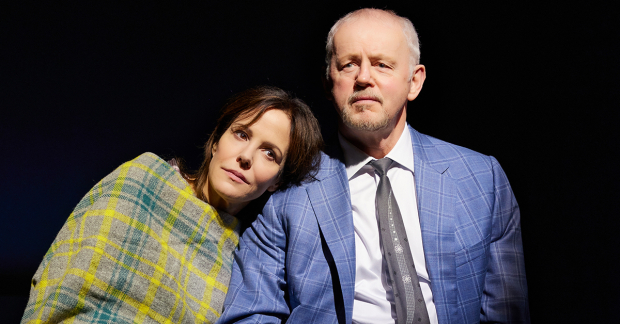Review: A Richly Deserved, Long-Belated Broadway Bow for Paula Vogel's How I Learned to Drive
Mary-Louise Parker and David Morse return to roles they originated 25 years ago in this Pulitzer Prize-winning drama.

(© Jeremy Daniel)
"Apparently," Paula Vogel writes in the published version of her 1998 Pulitzer winner How I Learned to Drive, "the distance from the Vineyard Theatre on East 15th Street to the Market Theatre in Johannesburg or Croatia or Taiwan is not as far as the distance to Times Square." True, if there were an award for "Longest Time Between Off-Broadway Production and Broadway Transfer," in recent memory, Drive would win hands down. It's been 25 years since Mary-Louise Parker and David Morse broke hearts in this seminal drama of the late 20th Century, and now, courtesy of Manhattan Theatre Club, they're getting to do it in Midtown.
Time has intensified every aspect. It has allowed Vogel's script to become even more of a marvel as it searches for compassion and humor in the most unlikely of places. It has given original director Mark Brokaw the chance to soup up an engine that he built for a small theater into a much larger one, while still retaining the horsepower. And it gives us the opportunity to realize the full breadth of talent within Parker and Morse, who are both giving career-best performances here. If you're a believer, as I am, that all things happen when they're supposed to, may this long-belated Broadway premiere be Vogel's silver lining. The trip might have taken a while, but it was well worth the wait.
How I Learn to Drive follows the explicitly sexual relationship between Li'l Bit (Parker) and her Uncle Peck (Morse), which began when she was 11 and lasted all the way through college. Vogel's journey through the fragments of Li'l Bit's memory depicts Peck, her maternal aunt's husband, as a predator who manipulates into bed the niece he once held in the palm of his hand, while simultaneously serving as the father figure she never had.
Both Parker and Morse achieve performances that should be studied by future generations of actors. As we all know by now, Parker is one of our best contemporary stage actors, and her Li'l Bit is both definitive and a marvel of full-bodied acting. With the slouch of a shoulder, the curl of a lip, an untucked shirt (the fine costumes are by Dede Ayite), this adult woman is 18 again, or in junior high, or being taught how to drive by the uncle that took advantage of her. Her work is meticulous and carefully calibrated, allowing the cracks in the façade to get deeper and deeper, all while possessing an inner strength that helps her overcome her past.
We all know the Peck type, that unassuming neighbor with a dark secret. Morse leans into it with a touch of Clintonian elan for good measure — he's a bad man whose manipulation is allowed because of his plain-spoken ordinariness. But he also leans just as heavily into the other shades of Peck, the man that's already broken, who knows what he's doing is wrong (or does he?) but can't resist. Morse exquisitely and deceptively does the impossible: he actually makes you feel pity for a child molester. And as you force yourself into a cold shower to rid yourself of that feeling, you realize how good Morse really is.

(© Jeremy Daniel)
Brokaw elicits similarly great work from their three costars, Johanna Day, another holdover returning to her original role, and newcomers Alyssa May Gold and Chris Myers. Day has a jaw-dropper of a monologue as Peck's wife, who is prone to forgiving her husband while blaming her niece for his indiscretions (she also plays Li'l Bit's mother, who does the same thing). Myers robustly steals scenes as Li'l Bit's lecherous grandfather and an Urkel-esque nerd who wants to dance with her at the junior high social. Gold rounds out this so-called "Greek Chorus" as both Li'l Bit's grandma, married off at 14 and having never had an orgasm, and the 11-year-old Li'l Bit herself as she is abused by Peck for the first time. "This isn't happening," she pathetically cries out, a sentence ringing in my ears as I type this.
In her published intro, Vogel writes, in part, "I have been told since 1997 that my play, written by a woman playwright, is not universal enough to receive a Broadway production." That's the bullshit of gatekeeping, of course — according to RAINN, one in nine American girls under the age of 18 experience sexual abuse or assault at the hands of an adult, and one in six women have been the victim of an attempted or completed rape in her lifetime. There is no more universal a story than this one, unfortunately.
But in a way, doing this play on Broadway in 2022 is perhaps more provocative than it would have been even two years ago, when it was originally scheduled to run. In our polarized world, where everything is either right or wrong with no in-between, the idea of Li'l Bit coming to recognize Peck as a bad person who did some good things will undoubtedly turn off audience members looking for a simple black and white argument against him. But the beauty of the play lies in that middle ground, that ability to see things from multiple angles, and that is Vogel's greatest strength as a writer. How I Learned to Drive is the most challenging, thought-provoking play of the season, and thank God it's finally on Broadway.









